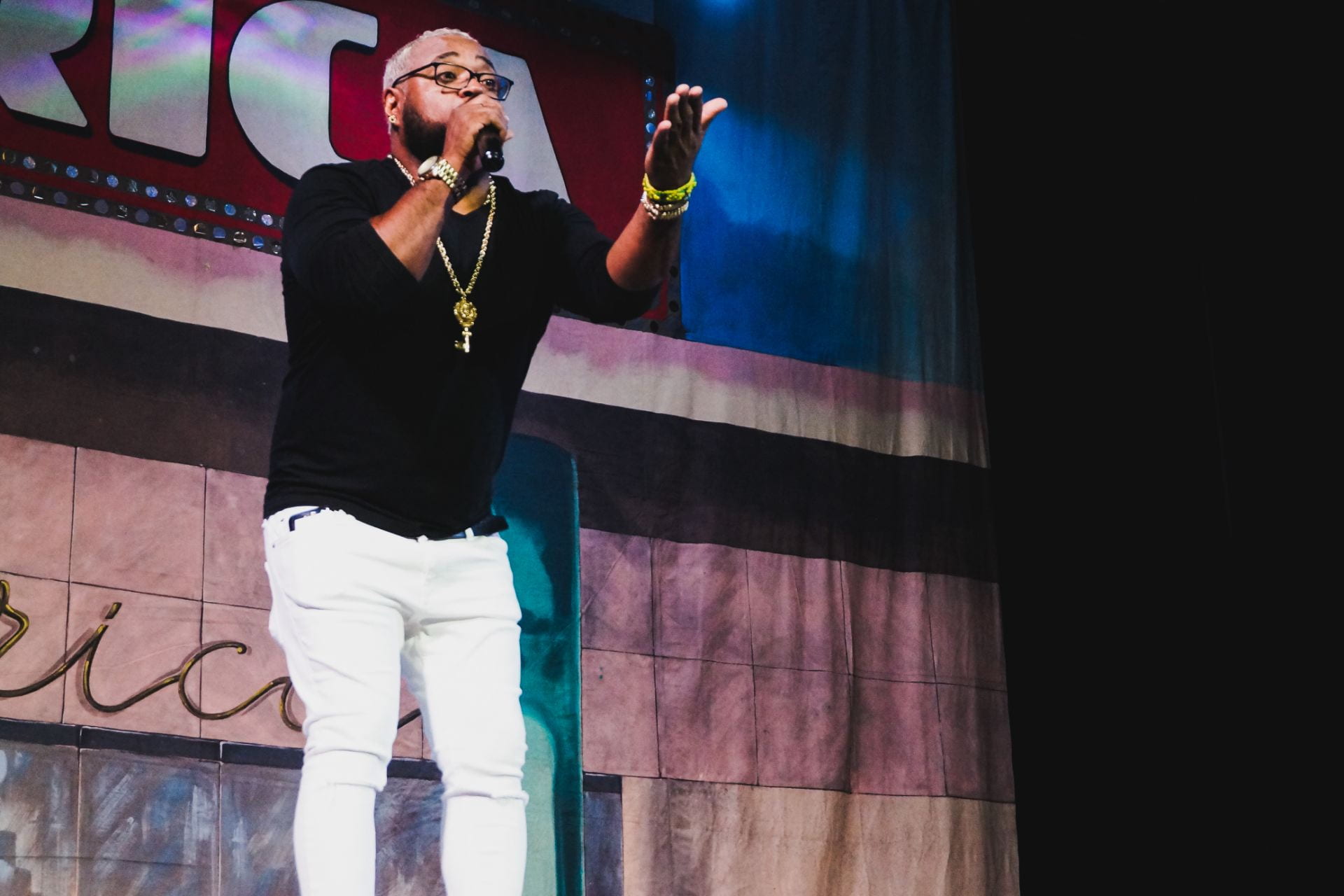No joke: In Cuba, comedy is a tool for survival
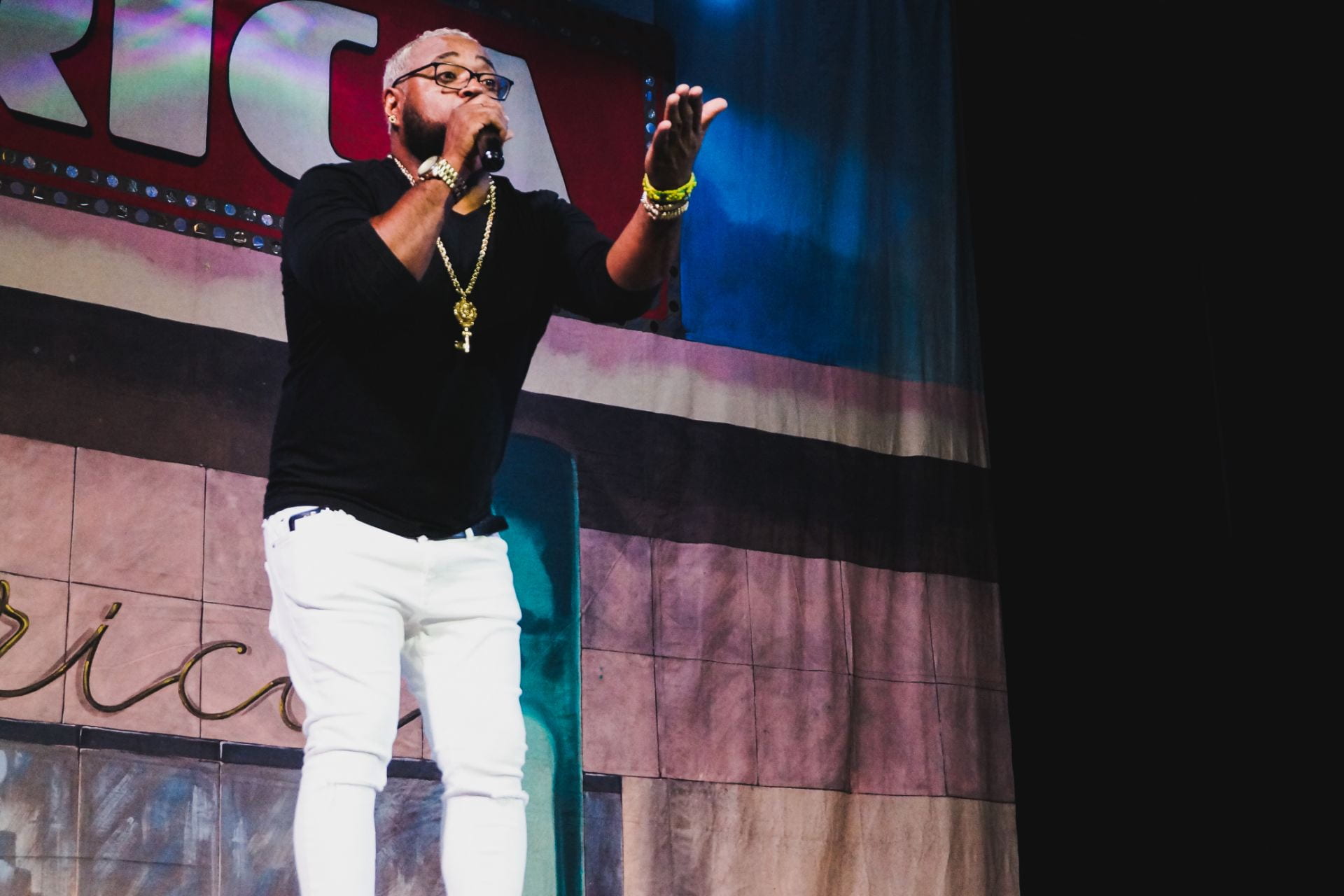
By Emily Mitchell
HAVANA, Cuba – On the unassuming calle Galiano in Centro Havana, hundreds of people are impatiently waiting before the doors of the Teatro América. One woman is scalping tickets. Another is discussing sharing a seat with her boyfriend. The line, resembling more a mob, has snaked into the street. It’s dark outside — there aren’t many street lights in the capital city— but the Teatro’s glittering neon sign illuminates the street as people arrive on foot from all corners of Havana.
They’re here for the 20th anniversary of La Esquina de Mariconchi (Mariconchi’s Corner), the city’s most popular weekly comedy show. As the titular host, Orlando Manrufo portrays a middle-aged mother of three whose quick wit and unapologetic derision delight the 1700-person audience every Thursday.
Manrufo’s production partner, Ricardo Isidrón, has been the show’s director since its conception. “20 years ago, I decided that humor was the best medicine for the bad-tempered,” says Isidrón, 64. “It always pleases me to see an audience smile. Our show rejuvenates them, I think. People forget a little bit about their problems.”
The show is a who’s who of local talent, ranging from ventriloquists to singers to traditional stand-ups. Mariconchi has something for everyone, as long as they’re game for a laugh.
Mariconchi is one of many key players shaping today’s bustling stand-up community scene in Havana. In a city lacking basic infrastructure and socioeconomic mobility, comedy is the survival tool of choice. Many people don’t feel comfortable speaking explicitly about the challenges of daily Cuban life. Instead, they joke around what makes life so hard there, employing humor as a coping mechanism to digest their struggles and give themselves voice.
Cubans joke that a police station is really just a free hotel; Manrufo pretends he’s a crossdressing matriarch. Career comedians give their audiences the de-stressor they crave, and in turn, locals revere comics as Havana’s A-List celebrities.
“Without a doubt, humor is the most effective language that Cubans have,” says award-winning author and comedy writer Jorge Piñero, 55. “Cubans carry humor in their blood.”
Cuba’s love for humor can be traced back decades and is best characterized by the country’s reverence for Charlie Chaplin, one of the world’s most recognizable comic actors famous for his roles in black and white silent films. Chaplin’s image is plastered across Havana in street art and hanging as photos inside homes.
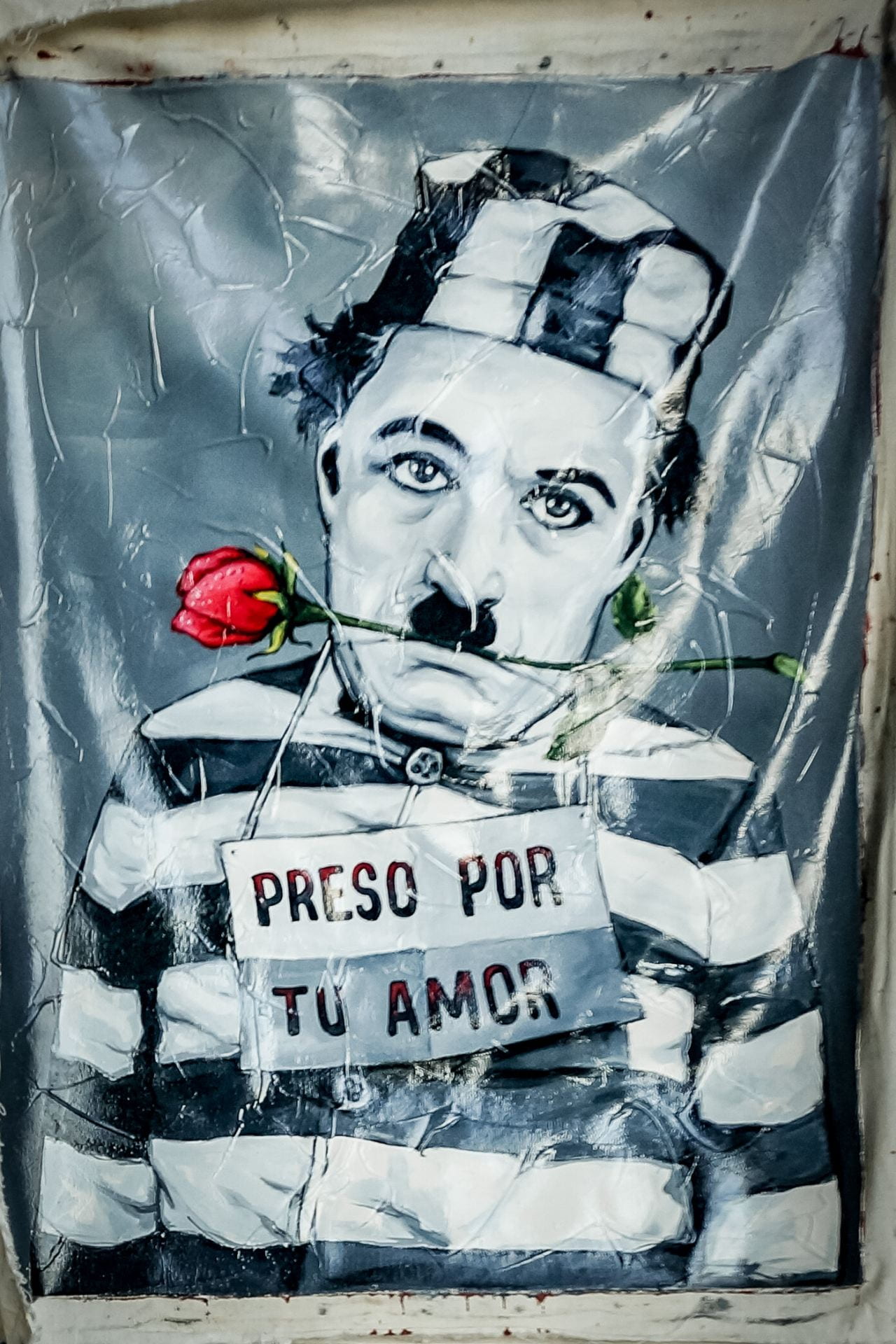
Cafetería el Carmelo, a Charlie Chaplin-themed restaurant in the residential neighborhood of Vedado, boasts walls adorned with fluorescent Chaplin silhouettes and stills from his films. Fernando Acuya, Carmela’s manager since 2015, sees Chaplin, grease moustache and all, as a Cuban tradition.
“Charlie Chaplin was someone who triumphed in life as a poor man,” says Acuya. “He was also mute, but even so still triumphed. That’s why he’s very loved here in Cuba.”
Today, many comics cite Chaplin as one of their driving influences. Luis Pérez, known on the circuit as Newito, has performed in the silent comedy trio La Oveja Negra (Black Sheep) since 1994. For him, Chaplin was the ultimate comedian. In creating art without, he in effect made his audience limitless.
“100 years later, his movies are understandable to anyone today,” says Pérez, 47. “Because [his comedy] is universal. That’s why La Oveja Negra performs silently.”
Pérez entered the comedy scene in the ‘80s while studying at the Universidad Central de Las Villas in Santa Clara. “A lot of humor was being made during this time, mostly by universities,” says Pérez. “But it all stopped with the Special Period.”
The Special Period began in 1991 when the Soviet Union fell, Cuba’s biggest trade partner. Without Soviet support, Cuba spiraled into severe economic depression. Petroleum stopped coming in, and people starved from lack of food imports. Professor Luís René Fernández, who has been studying U.S.-Cuban relations and economics at the Universidad de la Habana since 1989, says the effect was immediate.
“Life was good, and then it all disappeared from day to night,” says Fernández. “The relationship [between Cuba and the Soviet Union] was too important. All the resources came from one source, and then that source disappeared.”
It was during this time that the Centro Promotor del Humor was founded. The Centro was created in 1994 by the Ministry of Culture, a sector of the government dedicated to preserving and proliferating Cuban culture. Located in Vedado, the office’s sole responsibility is to promote humor. The Centro fosters the careers of humoristas by connecting them with venues and opportunities that showcase comedic talents to the Cuban people.
Annually, the Centro hosts the Festival Nacional del Humor Aquelarre to spotlight new performers. Winners receive a bronze plaque with the well-known Centro logo: — a banana, partially opened, with jester bells on the end of its peels. The fruit is universally recognized as a symbol of humor (cue “slipping on a banana peel” gag). But the logo’s double entendre stems from local roots.
“During the Special Period, the banana was always around when people were starving,” says Pérez, who has been with the Centro since the beginning. “It was dependable, consistent, like Cuban humor.”
Then and now, Cuban humor is everywhere . “Every Cuban person carries a comedian inside them,” says comic and YouTuber Robertico Riverón, 47. “They are the only people who take everything as a joke. Because if we took it seriously, we’d die.”
Leonardo Martínez, whose comedic expertise comprises of parody songs and couple jokes, has been performing up to five times a week since 1993. At the end of each set, he closes not with a big laugh, but with an original a capella song. On the anniversary of La Esquina de Mariconchi, he is the closing act. The audience clearly adores him, but becomes respectfully quiet as he begins to sing.
“Sometimes, during a joke, there can be a lot of silence,” Piñero comments from backstage. “It’s because there is so much relation between the public and what they’re seeing.”
Martínez, 49, studied dance and singing in college, and it shows. His booming voice shakes the theater’s outdated sound system as he stands at the edge of the stage.
He calls for the crowd’s applause of him and the night’s talent. They won’t let him finish his note before the clapping and whistling envelope him. “That’s all there is to it,” he sings. They agree.
“I thank God that I am still performing comedy,” Martínez says. “But it’s complicated. The country knows this— humor has always been critical. Humor cannot come in any other form.”
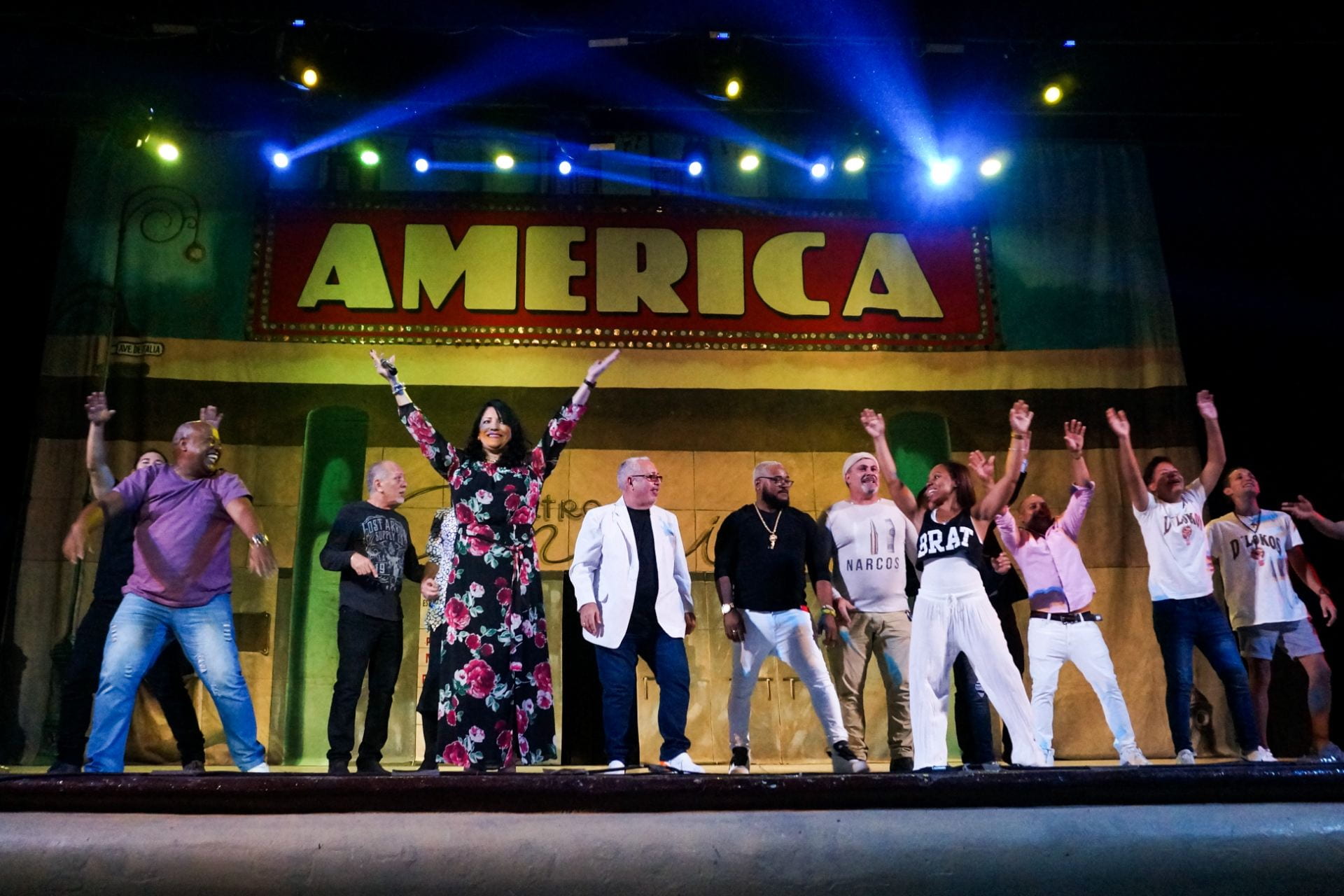
Cuba’s most treasured form of critical comedy comes in the form of Pánfilo, a satirical character made famous by comedy actor Luis Silva. In his weekly show, “Vivir del Cuento,” Pánfilo mumbles and grumbles about life’s inconveniences to anyone who will listen. As a retiree, he is often frustrated with his limited pension, and often complains about rising prices and simpler times.
Silva, 41, is considered practically interchangeable with his character, despite Pánfilo being at least 30 years his senior. “Vivir del Cuento” has become a Monday night ritual Cuban households. Families tune in to see who Pánfilo puts on trial, and to connect with his frustrations.
“If you analyze a serious problem, and you connect with a Cuban reality, it could be very subtle but everyone understands,” says Fernández, who watched Pánfilo religiously. “I think this is a real artist. Real artists don’t say, ‘down with the government!’ This is not art.”
Even President Obama understood Pánfilo’s impact, and knew he needed the character on his side to win the Cuban people’s hearts. He and Silva filmed a series of sketches before and during Obama’s momentous 2016 trip to Havana. Before his arrival, Pánfilo reminds him, “Don’t come with heavy luggage, or you’ll get stuck at the airport. You’re only coming for a few days!”
Manrufo’s Mariconchi makes similar jokes. Backstage at the Teatro, with a baseball cap replacing his usual wig, Manrufo details one of his favorites: He has two older sisters whom he calls often, and one often shares things she’s heard or read. He mimes a phone call – “Sister, where did you get that information? No, no, no — don’t listen to things that you can’t interpret! Where you read this? That people cannot go to bed without eating. What, do you not go to bed?”
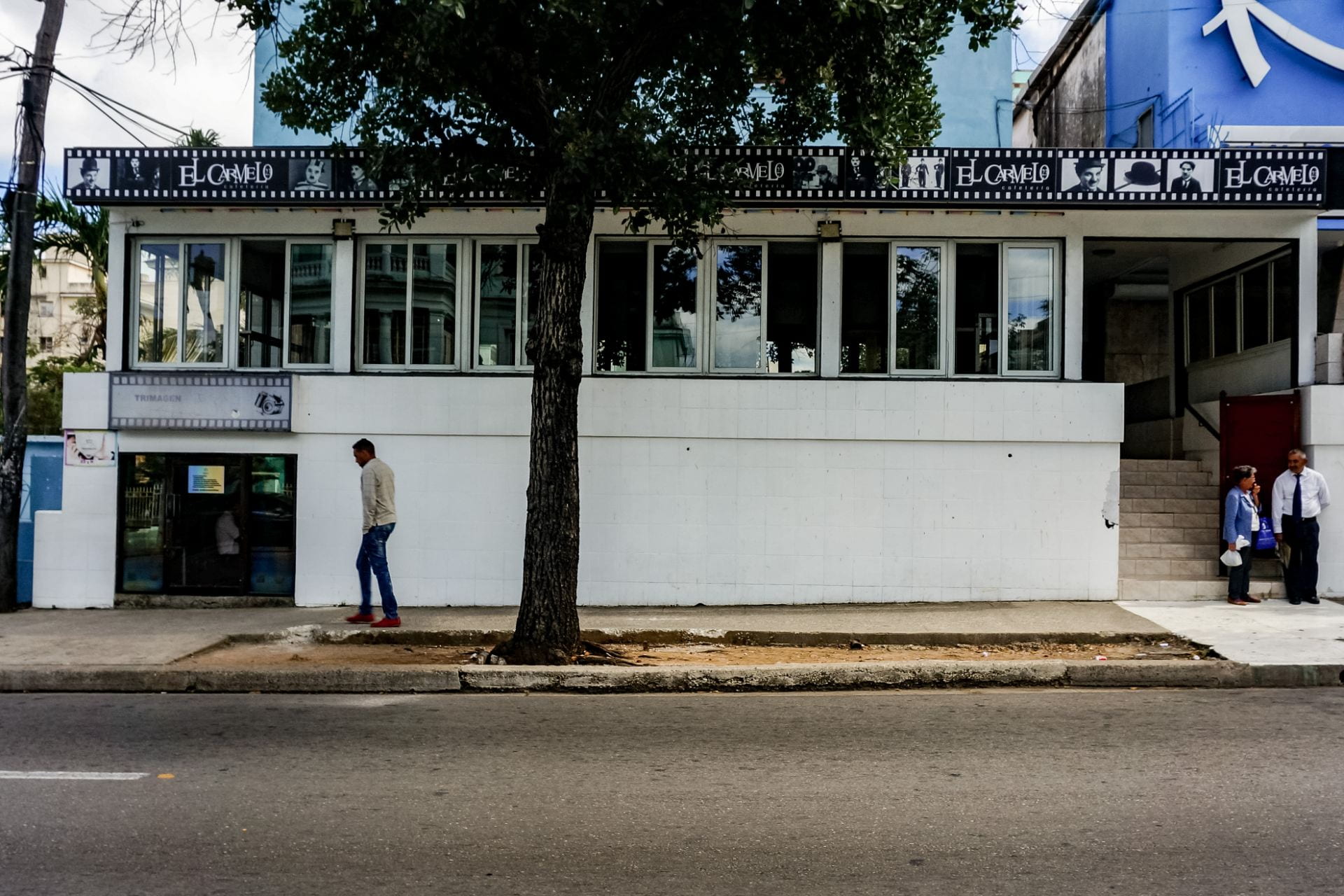
Mariconchi and Pánfilo are caricatures, but they flawlessly embody cubanía — the essence of what it means to be Cuban. The jokes don’t meander through an elaborate set up and a complicated punch line. Cuban comedy is irreverent, genuine and always relatable. The audiences revel in the laughter, and their faces light up when they recognize a punchline. They fill up clubs all over Havana to witness it – even on weeknights, often until 3 in the morning. They say these shows help them survive.
“There are some things a foreigner wouldn’t understand [at a show], because it’s local humor,” says Isidrón backstage at the Teatro América. “But that’s our humor. We do a type of humor that Cubans understand. Our criticisms are ours.”
As La Esquina de Mariconchi comes to a close, over a dozen comedians join a local salsa singer on stage, laughing and dancing while she performs. The audience, quick to join, is on its feet and applauding frantically. Well over its 1700-seat capacity, the cheers are deafening.
Martha Brooks, who has been a devoted spectator for more years than she can count, grins as she and her adult daughter step to the music. She has instilled in her daughter a generations-old appreciation for comedy, which Brooks learned from her own mother. “Ever since I was a girl,” she says, “Con el humor y el amor, todo se puede.” With humor and love, you can do anything.
